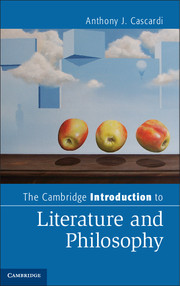Book contents
- Frontmatter
- Contents
- Acknowledgments
- Introduction
- Part I Questions of Truth and Knowledge
- Part II Questions of Value
- Part III Questions of Form
- Chapter 9 Ubiquitous Form
- Chapter 10 Linguistic Turns
- Chapter 11 Form, Narrative, Novel
- Chapter 12 Forms and Fragments
- Afterword Limits
- Glossary of Keywords
- Notes
- Index
- References
Chapter 10 - Linguistic Turns
Published online by Cambridge University Press: 05 June 2014
- Frontmatter
- Contents
- Acknowledgments
- Introduction
- Part I Questions of Truth and Knowledge
- Part II Questions of Value
- Part III Questions of Form
- Chapter 9 Ubiquitous Form
- Chapter 10 Linguistic Turns
- Chapter 11 Form, Narrative, Novel
- Chapter 12 Forms and Fragments
- Afterword Limits
- Glossary of Keywords
- Notes
- Index
- References
Summary
“Truth consisteth in the right ordering of names in our affirmations.”
Hobbes, LeviathanThe area of ordinary language philosophy discussed in Chapter 9 is one of a number of instances where philosophy in the twentieth century made a turn toward language. This “linguistic turn” implied a turn away from a set of questions that had been dominant in philosophy for the previous few centuries. Beginning with Descartes, those questions had come to center around the relationship between the mind and the world. Questions of truth and value were organized around epistemology, which saw itself as “first philosophy.” The linguistic turn displaced those concerns with an interest in the relationship between language and the world. This did not come about for any accidental reason, but rather because it was hoped that the philosophy of language could answer questions that epistemology could not resolve. The linguistic turn did not leave everything else in place. Language involves questions of reference and meaning, and a satisfactory understanding of such things can’t be produced simply by replacing the notion of mental representations with the notion of linguistic representations.
I will have more to say about this shifting terrain over the course of what follows, but first we should indicate the role that literature had to play in the evolution of these views. First, literature is a form of discourse where meaning is crucial and yet is hardly dependent on a belief that the function of language is to represent the world. It is not at all clear that all literary language “represents” or “refers” at all. Second, literature is a domain where various kinds of “non-literal” meanings (including metaphor and other examples of figurative speech) are fundamental. Third, literature is a domain in which the “intentions” of speakers cannot be assessed in the ways in which we might assess the intentions of speakers in other contexts. The intentions of the narrator in a novel by Tolstoy, of a character in a play by Schiller, or of the speaking “I” in a poem by John Ashbery are not fathomable according to a single scheme of what “intention” may mean, and may not align with our understanding of intentions in ordinary speech at all.
- Type
- Chapter
- Information
- The Cambridge Introduction to Literature and Philosophy , pp. 142 - 154Publisher: Cambridge University PressPrint publication year: 2014

